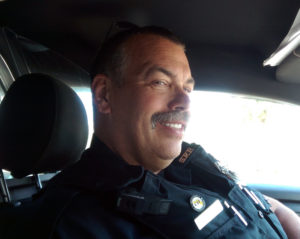
The juvenile justice system is frustrating, Brandow says.
By DINORAH PREVOST
USFSP Student Reporter
ST. PETERSBURG – At 52, Scott Brandow is one of the oldest officers out on patrol at the St. Petersburg Police Department.
Most patrol officers are in their 20s and early 30s. Going on patrol is the way they learn the groundwork of policing.
Brandow patrols District 1, specifically the Jordan Park and Wildwood Heights neighborhoods.
He became a police officer in 1985. He came to the St. Petersburg department in 2016 from the Jacksonville Sheriff’s Office.
Spending a day with Brandow offers a glimpse into basic police work:
- On traffic stops, officers show up in pairs – or more – to protect themselves and back each other up. It’s not meant to intimidate or scare the driver. Brandow went to a traffic stop to support Officer Cody DeLoach, 29, who patrols the next neighborhood over.
- The juvenile justice system is probably the most broken part of the local justice system, Brandow said. The kids who commit offenses leave police custody without much punishment and sometimes go on to offend repeatedly.
He said those situations can be much more of a burden to the parents who have to pick them up and deal with the aftermath. - In the neighborhoods that they patrol, Brandow said, officers have to consciously avoid stereotyping residents based on the officer’s or law enforcement’s previous interactions with the person’s family.
If a father deals marijuana, that doesn’t mean that his son is also a dealer, he said. He works to approach a person with a clean slate every time.This is key to maintaining good relationships with neighborhood residents, he said, especially those who are already skeptical of police. - There’s an enormous amount of paperwork in police work, and it’s compounded by the number of charges a suspect racks up.
An arrest at a problem liquor store resulted in four charges, including one for possessing spice, a synthetic drug, and another for possessing ammunition as a convicted felon. In between calls during an eight-hour shift, Brandow spent much of his time in the car filling out forms in two different systems that the department uses.
He also logged the evidence in the department’s evidence room at the station and went back to the liquor store to get a statement from the owner.
Brandow wishes that the news media would highlight more positive things police officers do, such as their follow-ups with neighborhood kids whom they’ve picked up for shoplifting and other offenses. He said that they also check on kids who officers have noted are in less-than-ideal family situations.
He said most cops are good. They end up paying for what the bad cops do in the department’s relationship with the public and news media.
Often only snippets of incidents are caught on tape, he said. That leads to misconceptions, and it makes it hard for police to tell their side of the story.
